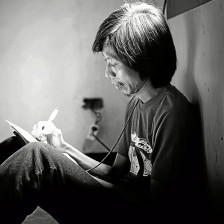Ericson Acosta will be free soon—De Lima
Activist poet Ericson Acosta will soon be a free man and satisfy his desperate yearning for “sea and sky.”
The Department of Justice (DOJ) on Thursday ordered the Samar provincial prosecutor to withdraw the illegal possession of firearms and explosives charges filed against Acosta in the province after finding irregularities in the military’s handling of his arrest and detention in February 2011.
“(The) finding of probable cause has been reversed and his case has been dismissed,” Justice Secretary Leila de Lima said.
Acosta will be a free man as soon as the court acts on the motion to withdraw the charges, she said.
In a statement released through the Free Ericson Acosta Campaign (FEAC), Acosta welcomed the reversal of his indictment and thanked those who supported the crusade to free him.
Article continues after this advertisementYearning
Article continues after this advertisement
“In jail, I yearned for sea and sky. Freedom cannot be achieved by mere yearning, only by struggle,” Acosta said.
Asked what he would do when he is released, he said: “I would personally thank everyone who campaigned for my release—my family, lawyers, friends, former classmates and colleagues, fellow artists and human rights advocates.”
Acosta said he would also join the crusade to free all political prisoners in the country.
“The unwarranted arrest and torture torment political prisoners each day they remain in prison. Political prisoners are rendered de facto criminals and terrorists, deprived of due process, forced to be at the mercy of the military. This injustice has to end,” he said.
Free to write
FEAC members held a short program outside the National Kidney and Transplant Institute in Quezon City where Acosta has been confined since Jan. 17 while awaiting an operation for a kidney ailment.
“He is now free to write poems and songs outside prison,” the FEAC said in a statement.
Acosta, a researcher for nongovernment organizations in Samar, was arrested without warrant by the Army on Feb. 13, 2011, in San Jorge, Samar. The military accused Acosta of being a communist guerilla and filed a case of illegal possession of firearms and explosives against him after allegedly seizing from him communist documents and a hand grenade, among other items. He was imprisoned for 22 months before the Samar court approved his release from jail so he could obtain medical treatment.
Acosta questioned his warrantless arrest and the charges against him and claimed that the military had planted the grenade found on him after alleging he had ties with the communist New People’s Army.
The campaign to free Acosta, led by his elderly parents, enlisted the support of local and international groups like Amnesty International and PEN International and social activists from the United Kingdom, Canada, New Zealand and Belgium.
The DOJ resolution signed by undersecretary Francisco Baraan III said there was no legal basis to hold Acosta liable for the crime imputed to him and that therefore the charges against him should be dismissed for lack of probable cause.
It also said that the application of “presumption of regularity” in the acts of the military was not warranted in the Acosta case.
Irregularities
“We find that numerous irregularities transpired in the arrest, detention and turnover of respondent Acosta to the police authorities, which leads us to seriously doubt the validity of the charges against him,” the DOJ said.
It noted for instance that Acosta was not taken immediately to the nearest police station or jail upon his arrest. The arresting officers also did not give Acosta any chance to communicate with his lawyer or members of his family.
There was also no proper inventory of the grenade allegedly found on Acosta, it said.
The DOJ said the arresting officers should have extended to Acosta his criminal due process rights “regardless of whether he was arrested in Manila or the mountainous terrains of Samar.”
It ordered the Samar provincial prosecutor to file the motion to withdraw the charges against Acosta and to report to the DOJ in writing of its compliance within five days from doing so.
